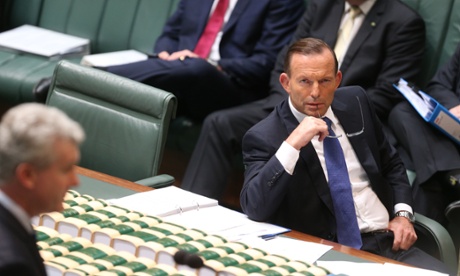
Night time political wrap
Here is your bloomin’ lot for the day:
- The foreign fighters bill is set to pass the senate with the support of Labor, which does want amendments but will not insist upon them. Liberal chair of the human rights committee Dean Smith has urged attorney general George Brandis to explain why the greater powers are justified. The Greens are opposing, as are Nick Xenophon and David Leyonhjelm.
- The government has imposed a petrol tax rise due in two weeks time, bypassing the parliament and drawing the ire of the Victorian premier Denis Napthine, motoring groups, business groups and conservative supporters.
- Palmer United senators will vote against the higher education deregulation as a Coalition-dominated senate committee report called for a rethink of the increases in student interest rates.
- Speaker Bronwyn Bishop found Barnaby Joyce had no case to answer in changing the hansard, though she did not look at the tape of his speech as Labor had requested. She said because he cleared up the matter by “counselling staff”, there was no prima facie case against him.
Thanks to my partner in crime Mike Bowers and the wonderful Guardianistas here in the bureau, without whom I would go cross-eyed.
Goodnight.
PUP senator Jacqui Lambie is railing about terrorists on welfare and with the right to vote. She is going out beyond the foreign fighters bill, saying Tony Abbott has turned a blind eye to home grown terrorism.
She is going back to section 44 of the constitution and has urged that the powers should be expanded to strip people of their allegiance to foreign powers and their right to vote. Currently you can’t bear allegiance to a foreign power and be in the parliament.
If you are going to carry on with that sort of rot, the first thing we have to ensure is that they do not receive any government funds or entitlements and don’t have the right to vote and a deported immediately.
Scott Ludlam said the Greens would oppose the plans to share biometric materials which identify faces at airports, which he calls “one of the most troubling aspects of the bill”.
He says it passes automatic surveillance activities over the entire population and he quotes the privacy commissioner urging a review of privacy aspects.
He says the extraordinary haste rushing the bill through the parliament was reflected today in the explanatory memoranda just being presented to the senate.
Ink was still wet.
In the middle of foreign fighters, the higher education (university deregulation) report has been released. This from Daniel Hurst:
A Coalition-dominated committee has called on the government to rethink the proposed increase to student loan interest rates, warning of “unforeseen impacts”.
The Senate’s Education and Employment Legislation Committee recommended the parliament pass the bill to remove caps on university fees, but suggested “a structural adjustment package to assist certain sections of the higher education sector transition to a fully deregulated system”.
Labor and the Greens published dissenting reports.
Greens senator Scott Ludlam says Labor has waved through the first national security bill and will wave through this second one - the foreign fighters bill.
Once again left to the crossbenchers to be the opposition on this debate...It is left to the crossbenchers to provide that critical thought.
Greens senator Scott Ludlam picks up the point on the foreign fighters bill that Australians fighting overseas is nothing new.
I would be interested to know whether the government has given any thought to combatants on both sides who might have travelled to Gaza during Israel’s recent bombardment there? Or whether somehow they are not to be considered within the scope of this legislation.
Ludlam says the crossbenchers were not allowed to scrutinise the legislation in the senate committee because the government removed any crossbench representation - as a result it was a major party show which will be pushed through the parliament.
Labor senator Stephen Conroy says the bill does deliver greater powers for intelligence and law enforcement agencies but it also delivers important safeguards. He commends the bill to the senate.
So we have had the Liberal senator Dean Smith’s human rights committee asking the government to justify itself on human rights breaches in the foreign fighters bill. Now we have Labor’s Stephen Conroy saying Australia’s laws have to evolve to meet the changing environment and the most recent threat is Australians going abroad to fight with foreign forces.
Liberal Senator Dean Smith reminded the senate that the human rights committee’s job was to undertake a “technical and bipartisan” examination of legislation “in the absence of partisan politics”.
And he did.
Smith said the committee expects ministers to justify the need for human rights limitations in any laws in each “statement of compatibility”.
Legislation can limit human rights if it can be shown to be reasonable necessary and proportionate in pursuit of a legitimate objective...
The statement of compatibility does not fully explain why the measures are necessary in pursuit of a legitimate objective, in particular it does not explain how and why existing law enforcement and intelligence gathering powers are insufficient to prevent serious threats to Australia’s national security interests.
Smith says the committee is seeking further explanation from attorney general George Brandis, who is responsible for the legislation.
Liberal committee chair critical of foreign fighter human rights breaches
Liberal senator Dean Smith, the chair of the Parliamentary Joint Committee on Human Rights, has delivered a report from the 10 member multiparty committee which scrutinises legislation for its impact on human rights.
The committee’s report is particularly timely in relation to the foreign fighters bill due to be debated tonight in the senate. The report identifies a number of “possible breaches” of human rights and then calls for the government to justify infringements of of basic human rights.
This was Smith in the senate in the last hour.
It is not the ambition of this committee to be inconvenient to the desire and duty of governments to protect citizens from the harm of others and the deliberate evils of terrorism. But the scrutiny role of this committee in this senate must always be to shine a light on real and possible breaches of those fundamental rights and liberties; the right of freedom for arbitrary detention, the right to freedom of movement, the right to a fair trial, the right to presumption of innocence, the right to privacy, the rights to freedom of expression and association.
The Australian Chamber of Commerce and Industry has joined the chorus condemning the petrol excise rise.
Spokesman John Osborn says the charges place extra pressure on business and is “anti-growth”.
Business understands the government’s challenge to balance the budget and supports many measures to cut spending and return to surplus. However, there is very little reason to raise fuel excise, which already far outstretches spending on roads, other than to increase consolidated revenues. It’s been estimated that only about a third of the fuel excise revenue is currently spent on roads. ACCI’s longstanding view is that fuel excise should only be applied for road transport reasons where these taxes are hypothecated to direct investment back into roads.
We are still waiting around for the senate report into the higher education changes.
Just taking stock as we slide towards the evening, we have the foreign fighters bill back on in the senate after the dinner adjournment until 10pm and the house is expected to rise no later than 9pm.
Tony Abbott is addressing the Business Council of Australia in Sydney after 8pm.
And poor old Denis Napthine must be thinking, with friends like this....
The Victorian premier is quoted in The Age as mightily unimpressed with the petrol decision and particularly the federal government’s decision to bypass parliament.
This is a situation where any increase in the cost for fuel for Victorian families and Victorian business will hurt those families and businesses. And I would believe these sorts of things should go through the proper parliamentary processes.
The Institute of Public Affairs is not happy with the Abbott government’s decision to bypass the parliament over the fuel excise.
The Abbott government’s decision today to ram petrol tax indexation past the Parliament is undemocratic and unnecessary. A fundamental democratic principle is that tax changes must be consented to by parliamentarians, as representatives of the Australian people, but the Abbott government will push through fuel tax indexation without debate, says IPA Senior Fellow Mikayla Novak.
But as the prime minister himself said before the last election, Australia’s budget problem ‘is not a revenue problem. The problem is a spending problem’.
Burning a bigger tax hole through the wallets of motorists is not the most effective way to address a budget emergency. The Abbott government should redouble its efforts to cut government spending, and ditch this unnecessary and undemocratic tax hike.
Interesting factoid.
The Chinese president is going to Tassie!
Xi Jinping is taking time after the G20 to visit the state and the ABC reports Chinese visitors have jumped 50% in recent months.
Xi was the guv of Fujian province, whose sister state is, you guessed it, Tasmania.
I hope Tasmanian senator Jacqui Lambie is on guard.
All over red rover
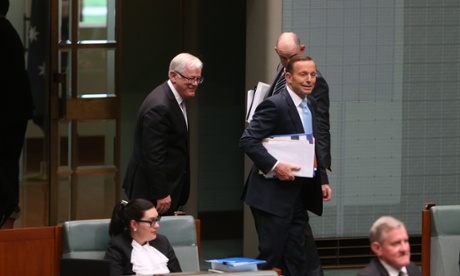
Playing to the gallery.
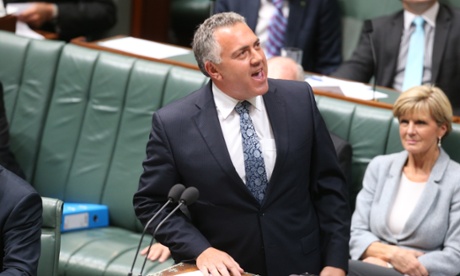
Madame Speaker.
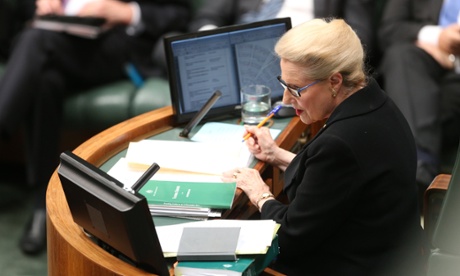
Back to the foreign fighters bill. Daniel Hurst has been trying to determine exactly what amendments Labor want to make to the foreign fighters bill.
Labor’s amendments would seek to alter the definition of the new offence of advocating terrorism to ensure it applied to someone who “counsels” the doing of terrorist acts, but not someone who “promotes” or “encourages” such acts.
Labor also wants to expand the list of allowable exemptions to the international “no-go zone” provisions to include undertaking a pilgrimage to a place of religious importance or living in an area for an extended period.
The bill’s proposed exemptions include making a bona fide visit to a family member, but Labor wants to add “or friend”.
All of which is a little academic, given Labor will not insist on the amendments in return for their votes of support in the senate.
Barnaby’s hansard chapter over
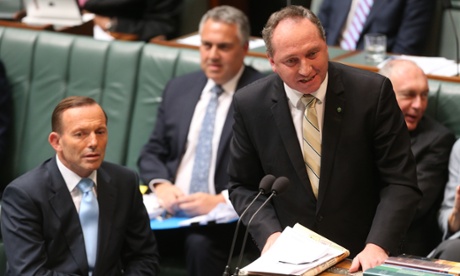
Captain Cook lands a blow.
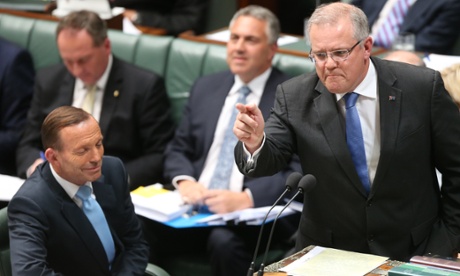
Red tie v blue tie
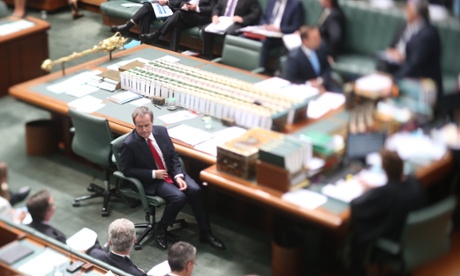
Bill Shorten is speaking to a matter of public importance on “the prime minister Americanising our universities and condemning Australian students to a debt sentence”.
Updated
Speaker says Joyce has no case to answer on hansard
Speaker Bishop notes Barnaby Joyce corrected the record and counselled his staff soon after the changes were pointed out in parliamentary question time. She says a “prima facie” case has not been made out that Joyce deliberately sought to mislead the house. Therefore, she did not look at the tape and the matter is closed.
Anthony Albanese yells out: “That’s right - blame the workers”.
Updated
Speaker Bishop now ruling on the Barnaby Hansard issue.
Everyone is trying to clear up answers from question time.
Barnaby Joyce suggested in question time that Labor had no agriculture policy at the last election so Joel Fitzgibbon has reminded the house the National Farmers Federation gave Labor a high score than the Coalition on their election report.
Joe Hockey is reading quotes proving the Coalition has supported Labor policies
You’ve got to get your facts right sweetheart! says Hockey.
The treasurer will withdraw that comment, Speaker Bishop says.
I wasn’t reflecting on the chair Madam Speaker, says Hockey.
Labor asks Abbott: Why is the PM forcing Australians to choose between owning their own home or going to university?
Abbott quotes Labor’s Andrew Leigh on setting universities free with deregulation.
Joe Hockey gets the final question and delivers slapstick demolition of the fact that Labor modelled an increase of the GST.
A government question to Christopher Pyne: Will the minister explain why it’s important to restore respect for the rule of law on building and construction sites in Australia and what threats exist to the government’s plan for reform?
This goes to the Construction Forestry Mining Energy Union.
It’s important to know who the CFMEU is because I think many members of the public don’t quite realise the kind of rogue union that we are talking about. This is a union that received a $1.5m record fine for criminal contempt of court just last year in 2014. So just thisyear in 2014 for its blockade of the Myer Emporium site. This is a union that’s been found guilty of contempt of court 28times since the year 2000, with links to gangland bosses like Mick Gatto through its secretary, with links to the Comancheros and the Rebels bikie gangs. And Labor’s response to this, Labor’s response to this information about the CFMEU which is quite public has been to welcome it back in to the Victorian Labor Party, Pyne says.
Uproar ensues and Speaker Bishop picks up an unparliamentary interjection and asks for its withdrawal.
Anthony Albanese eventually gets up and asks how is “Kathy Jackson” unparliamentary?
Updated
Shorten to Abbott: Before the last election the PM promised Australians no increases to taxes. Now millions of Australians are being slugged with a GP tax, a petrol tax, and now a higher GST. Why didn’t the PM tell the truth about his new taxes? Why should Australians have to pay for the PM’s lies?
The whole premise of the question is false. Fuel excise indexation is not a new tax, says Abbott.
Assistant education minister Sussan Ley does a pitch for the Victorian Liberal government, attacking the Victorian Labor opposition on their training policy.
Labor’s Mark Dreyfus is thrown out, joining Nick Champion, Husic and Perrett.
An animated PUP leader "is it groundhog day?" must be he left soon after his question @gabriellechan @GuardianAus pic.twitter.com/lgDsGEuDzu
— Mike Bowers (@mpbowers) October 28, 2014
Shorten asks Abbott: I refer to the PM’s plans to Americanise our universities. Given the PM is already saddling Australian students with a debt sentence, will he rule out applying the GST to university fees or does the conversation he’s asked Australia to have include applying the GST to university fees?
Abbott says it is Shorten who wants to Americanise our institutions.
In July of this year, addressing the New York Academy of Sciences, the Leader of the Opposition said in supporting start ups, nurturing creativity and rewarding ingenuity America shows us the way.
Immigration minister Morrison "we are this close" #QT @GuardianAus @gabriellechan http://t.co/t1KIyZoODS pic.twitter.com/FdyrexCkgZ
— Mike Bowers (@mpbowers) October 28, 2014
Communications minister Malcolm Turnbull is asked about the rollout of broadband in regional Australia.
In the seat of McMillan we now have fixed wireless services active in areas covering 2,700 premises with construction under way in areas covering an additional 2,000 premises and across the State, including in the seats of many of my colleagues here, there is construction going on in areas that cover 19,000 premises right across the State.
We have a new definition of Team Australia involving modelling.
Abbott:
I want a mature and rationale debate over the long-term future of this country and I invite members opposite to join and the best way of joining team Australia and doing the right thing by all of us would be to start by tabling that modelling.
Chris Bowen asks Tony Abbott about his promise prior to the election that there would be no rise in the GST.
Abbott says Australia needs to have a mature debate on tax reform.
We must do better if our nation is to be all it can be in the years and decades to come.
Justice minister Michael Keenan is asked about the governments boost in the Australian Federal Police at international airports.
The prime minister’s office has announced more details for the G20.
The leaders of five of Australia’s key partners – President François Hollande of France, President Xi Jinping of China, Federal Chancellor Merkel of Germany, Prime Minister David Cameron of the United Kingdom and Prime Minister Narendra Modi of India – will visit Australia as guests of the Australian Government, coinciding with the G20 Leaders’ Summit in Brisbane on 15 and 16 November.
Joel Fitzgibbon asks Barnaby Joyce, given the PM’s failure to rule out a GST on food, just how much will a lamb roast cost with the introduction of a GST?
Argy bargy over the question. Christopher Pyne says it’s a hypothetical on a hypothetical. Speaker Bishop allows the question.
Joyce stumbles through a very short answer.
Immigration minister Scott Morrison is asked a government question on his success on border protection which gives him an opportunity to stray into Richard Marles comments regarding turnbacks.
After the introduction of turnbacks for 5 months, do you know how many boats there were? None, absolutely none. Do you know how many boats turned up in the 5 months after that? One. The Leader of the Opposition likes to talk about Team Idiot. On border protection this is the captain of Team idiot.
As Morrison sits down, Shorten yells: How come you are so popular with your colleagues Scott?
Jenny Macklin asks Tony Abbott: the PM’s changes to the GST will mean another hit of another $3,900 every year. Why is the PM so determined to hurtAustralian families?
Abbott says the only government that modelled an increase in the GST was Labor. Table the advice, Abbott tells Macklin.
I discovered watching the news last night that members opposite, when they were in government, commissioned modelling on a rise in the GST to 12.5%. Now fair enough... Sometimes governments do commission the modelling. You own the modelling, you gave it to the media last night. Do the right thing and give it to the parliament now.
Ouch.
Foreign minister Julie Bishop is asked about the fight against Islamic State terrorists.
She is outlining the $13m package to fund community groups to counter extremism.
Bishop says the government is:
- funding a visit to Pakistan by an Australian female Islamic scholar to give a series of lectures focused on the important role of women in countering extremist narratives.
- supporting the UN global counter-terrorism strategy which underpins international efforts to address the causes of extremism and terrorism
- strengthen law enforcement while promoting global cooperation in counter-terrorism
- cancelling 73 passports on national security grounds.
Bowen to Abbott on the petrol ambush.
Can Abbott guarantee if the parliament does not pass the tariff, every cent will be returned to motorists and not oil companies?
The PM does not address the substance of the question.
Labor’s Ed Husic joins Graham Perrett in the sin bin.
@edhusicMP gets 94A-ed #QT @gabriellechan @GuardianAus http://t.co/t1KIyZoODS #politicslive pic.twitter.com/tdX1UmAF2w
— Mike Bowers (@mpbowers) October 28, 2014
Christopher Pyne is asked about the importance of the higher education reforms and he is quoting from The Australian an article by various vice-chancellors welcoming the deregulation.
Shorten asks Abbott about ambushing Australian motorists. Abbott does not back away from the increased petrol tariff.
This was a budget measure, a reasonable budget measure that was originally introduced by the Hawke Government in the days when Labor had real leadership and was really committed to the national interest and I’m very happy to see it coming back.
Small business minister Bruce Billson on the incredible savings since the carbon tax was scrapped.
Palmer: If we want women to fully participate in the work force we need to allow them to do so. Paid parental leave deals with the immediate afterbirth needs. Child care has a wider responsibility of freeing women to be all they could be. Palmer United senators will not allow paid parental leave to pass the senate. Will the government allocate the resources allocated for paid parental leave to be given to child care and set women free? Why is it that the government seeks to introduce 1950s Liberal Party policy? Is it Groundhog Day?
I’ve heard my paid parental leave scheme called many things but not 1950s Liberal Party policy. I think it’s the last thing the Liberal Party would have been proposing in the 1950s.
We can look after both child care and PPL, says Abbott.
Clive Palmer is asking the prime minister about setting women free again.
Bowen asks Hockey: I refer to the treasurer’s comments this morning that the Coalition previously, and I quote “let pass through the parliament Labor’s changes to make the private health insurance rebate fairer.” Given the hansard actually records the Liberal and National parties voted against this measure in the house and the senate, is the government so dysfunctional and chaotic it’s forgotten its own voting records?
Hockey says private health insurance means testing was a difficult issue for the Coalition and then raises Labor’s changes to take single women off pensions and on to Newstart.
I remember this guy coming to me begging me in that corner over there to help Labor to get through an initiative to take 60,000 single women off parental pensions and put them onto new start. So please, please spare us the hypocrisy.
Joe Hockey is asked a government question on addressing the debt and deficit burden of Australia.
He is calling for bipartisan agreement on policies to strengthen the economy - given the past 24 years of economic growth.
Unless my ears deceived me, Tony Abbott just called Bill Shorten the PM...
Then speaker Bishop calls Labor’s Bernie Ripoll for a question but says she can’t remember his seat. Oxley.
Strange days.
Labor MP Graham Perrett is turfed under 94A.
Tony Abbott takes a government question on the G20, and says jobs, growth and international tax rules will be on the agenda - plus the chance to “showcase” Australia.
Shorten asks Abbott about his “gutless” decision on petrol excise to “ambush motorists with a new $2.2 billion petrol tax with no mandate from the Australian people, with no mandate from the Parliament. How much will the PM’s petrol tax ambush cost the Australian people?”
Abbott said it’s not a new tax but the indexation of an old one which will cost the average family 40 cents a week extra.
John Faulkner says the joint committee on intelligence and security should have the power to initiate its own enquiries.
Labor’s John Faulkner has called for a comprehensive review of Australia’s national security agencies. After Labor supports the second national security laws.
As the hour of question time approaches, the speaker’s office has informed us that she will make a statement on Barnaby Joyce’s hansard hash after QT.
Liberal senator Sean Edwards said the government needs to stop Australians travelling to fight “otherwise we would be exporting our national security liabilities”.
The time come for us to debate our preparedness of being much more inclined to jail the enemy amongst us.
One more quote from Leyonhjelm on the threat of the 17-year-old Australian boy known as the Ginger Jihadi.
Giving away freedom for security is like giving your possessions to a thief so you will not be robbed. At the risk of repeating a worn phrase, it would be tempting to call Mr Abbott and Mr Shorten the girly men of personal freedom, but I don’t know of any girls who would be intimidated by threats from a spotty youth on YouTube. Young men with limited skills and an aggressive cast of mind have always been attracted to violence, and have often committed crimes. That those crimes are now sometimes committed in the name of Islam does not make them different from crimes committed in the name of communism or fascism, or even just due to testosterone. There is nothing unprecedented or urgent or super-risky about any of this.
Senator Leyonhjelm on the foreign fighters bill "sunlight is the best disinfectant @gabriellechan @GuardianAus pic.twitter.com/e6LuwxGa1T
— Mike Bowers (@mpbowers) October 28, 2014
David Leyonhjelm says the joint committee’s amendments to the foreign fighters bill are like putting a “bandaid on cancer”.
Leyonhjelm is making the point - similar to the one made by senator Peter Whish-Wilson which caused a stir - that terrorism is in the eye of the beholder so making laws for it is tricky.
It clearly hasn’t occurred to the Attorney-General that some countries and societies actually make good candidates for subverting: Zimbabwe, for example, or North Korea. I’m happy to say I support the overthrow of Kim Jong-un and Robert Mugabe and I wouldn’t mind if there was a bit of advocating terrorism to achieve that. What does that make me?
Leyonhjelm tells the senate that young men have always been attracted to extremist groups.
This bill has nothing to do with defeating Da’ish in Syria or Iraq. And it will not keep us safer here in Australia. The Attorney-General says that that the number of Australians presently involved in the conflict in Iraq and Syria is unparalleled. According to his figures, 160 Australians are currently supporting or fighting with extremist groups. And yet, 66 Australians fought in the Spanish Civil War. As a percentage of the Australian population in 1936, more Australians thought helping Communists or Fascists was a good thing than are currently supporting jihadists. Young men with a thirst for action and too much time on their hands have long joined gangs and become entangled with organised crime. These days, at least for a few, it seems violent religion provides an equivalent outlet.
Liberal Democrat David Leyonhjelm notes that it is fitting the senate is close to empty for the foreign fighters debate.
It reminds us of Edmund Burke’s observation that bad things happen when good people do nothing.
Liberal senator David Fawcett, a member of the joint committee on intelligence and security, is speaking for the government on the Counter Terrorism Legislation amendment (Foreign Fighters) bill 2014.
He is talking about the danger of lone wolf attacks and the importance of changing the laws to give security officers more powers in the current climate.
Fawcett says a witness to the committee raised the no-go zones and asked, what if I wanted to undertake language training in Mosul?
What reasonable person would seek to go to Mosul to do language training, where every reasonable person has fled or been beheaded?
Fawcett said the bill has had good scrutiny.
Shalailah Medhora reports from the joint party rooms - the Liberal and the National party rooms. Members were schtum on ebola and national security. Nothing to see here.
On the GST, Tony Abbott told the troops:
Nothing can or will happen unless all of the states want it because it is a tax for the states.
As Mathias Cormann was delivering the petrol price rise outside, inside the party room, the prime minister was saying the budget was coming under control.
Step by painful step (the budget) is coming under control. Unless we make these painful steps, it won’t get under control.
Updated
Senator Penny Wright has also criticised the government’s decision to gag senate debate so that the national security foreign fighters will be passed in the next 24 hours.
She is on to the no-go zones, which stops Australians travelling to certain areas without a legitimate reason.
It allows our government to draw red circles on the world map and allow anyone who goes there to be charged.
Speaking against the foreign fighters bill, Greens senator Penny Wright says the national security does not only target those with a criminal intent.
This will effect many everyday Australians and how they go about their lives.
And we are on to the foreign fighters bill in the senate with Labor’s Jacinta Collins telling us the impact Labor has had on changing the bill. (Labor intends to support the bill - as decided in caucus this morning.) Collins is outlining the argy bargy in the intelligence committee process, which reported more than a week ago with a number of amendments.
Like the first tranche of national security laws, Labor does not want to oppose but wants to throw a bone to its supporters who dislike the notion of limiting more freedoms.
Lunchtime political wrap
-
Petrol prices will rise after the government moved to increase a tariff to make up for the failure to get petrol indexation through the senate.
- Bill Shorten called the petrol tariff sneaky and a broken promise by Tony Abbott.
- Labor will begin an advertising campaign against the higher education changes while Clive Palmer committed his senators to voting against university deregulation.
Updated
Mathias Cormann gets to deliver the sandwich.
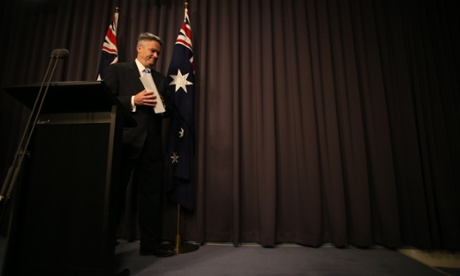
Joe Hockey is not behind the flags.
Back to foreign fighters in caucus:
Some Labor members argued the bill should not be passed before the government appointed the independent national security legislation monitor, a position which has been vacant since April.
Earlier in the meeting, Bill Shorten said Labor needed to take a considered approach to the issue and he believed the position recommended by shadow attorney general Mark Dreyfus “reflects Labor’s values”.
Labor will support the government’s proposed amendments but will also move several of its own amendments, including a general exception for legitimate travel under the new no-go zone provisions.
But Labor won’t insist on its own amendments.
It sounds like a deal too easy to refuse.
More Clive Palmer stream of consciousness on free education.
A free education is very important. When you graduate at 22 or 23, you don’t want to graduate with $100,000 or $200,000 debt or you will become an accountant or something very mundane. You want these sort of people to take risks so you get the Googles, the Apples, the Yahoos, they are not going to take risks if they have $200,000 debt already and they have a woman that loves them and wants to have children and we become a society with no ideas at all. We need the best and the brightest people to go to university to lead the nation into the future.
Daniel Hurst reports that Labor caucus has just decided to support the foreign fighters bill with the government’s amendments flowing from the recent committee report.
Four Labor MPs spoke in favour of the bill and four spoke against. The decision to support the bill was carried on the voices.
Bob Katter is holding a press conference on the decision by cattle producers and associated industries to sue the federal government for Labor’s decision in 2011 to suspend the live cattle trade.
The decision to take this matter up legally is one of the most important landmarks in Australian agricultural history.
As I understand it, Katter is alleging that the Labor government knew about what was happening in the Indonesian abattoir and let the program go ahead in order to provide a trigger for the ban. Which is a pretty big allegation.
(The Labor government) were cognisant of it and knew all about it in this place. That was going to be the trigger. There was no agreement at that meeting but it was pointed out, here is the trigger and this is what we want to happen. This was a government that was beholden to the Greens.
I stumbled out of bed. I got ready for the struggle.
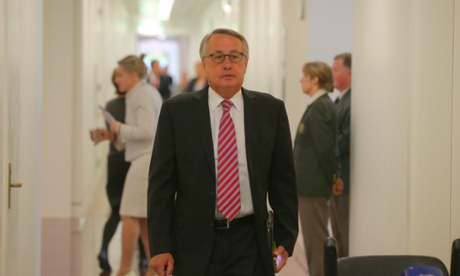
Richard Marles comments - opening the door to turning back asylum seeker boats with Indonesian permission - continue to dog Bill Shorten, who was photoshopped in one of the tabloids on the front of the Titanic with Tanya Plibersek - a la Leo and Kate.
What is your view as ALP leader on boat turn backs? Do you think the policy should change to consider it and do you support Richard Marles’ view that they have had an impact in stopping deaths at sea?
Labor’s policy on boat turn backs has not changed. It remains the same. The case hasn’t been made out for change and furthermore, when we look at what has effectively helped discourage the people smugglers, the origin of the success of this measure is in Labor’s regional settlement negotiations and regional processing.
Q: You don’t think boat turn backs have had any impact on stopping deaths at sea?
We don’t see that theevidence has been made outabout boat turn backs. Labor’spolicy hasn’t changed.
Q: Has Richard Marles gone rogue on you?
No, he was engaging in -we are engaging in a debate about hypotheticals.
Updated
Bill Shorten:
What it effectively means is that every motorist who ever goes to a petrol station, every time they get out the petrol pump and put it into the car is paying a new Tony Abbott petrol tax.
So petrol prices will rise in two weeks as a result of the indexation decision announced by Mathias Cormann.
Bill Shorten calls it a “sneaky decision”.
What is going to happen now is that Tony Abbott, who lied about no new taxes before the last election, who lied about no new GST, is now bypassing the parliament of Australia, the elected representatives who are put there by Australians to oversight the actions of a Government, he is so addicted to new taxes.
Former Queensland Labor premier Peter Beattie says he did not expect the GST to go above 10% when he signed up to John Howard’s Goods and Services Tax.
When I signed Qld up to the Howard Govt's GST I never expected the rate to ever go higher than the 10%; otherwise I would never have signed
— Peter Beattie (@SmartState1) October 28, 2014
But I bet he would take the revenue if he was still in state government.
Cormann was asked whether the government was considering other administrative methods of getting their budget measures through without the parliament. He said they are talking to the crossbenchers and looking at “how best to implement all of the important outstanding structural reforms”.
Q: This is a game of chicken with Labor and the Greens. You are saying back us or you will say (Labor and Greens) handed that money to big oil?
This is the government giving affect to our Budget measures, says Cormann.
Cormann says it will generate around $2.2 billion in fiscal terms.
The money we have lost so far it is a measure that starts slow and low and builds overtime. $35 million is what we have lost as a result of not having the measure passed in time for the 1 August implementation date.
Lenore Taylor asks about the effort to get around the senate.
This is not an effort to get around theSenate. This is using the legislation as it currently stands, this is using the powers and authorities that government has courtesy of relevant legislation.
So the move would still have to be validated by parliament. The obvious question to Mathias Cormann becomes what happens if it is not.
Q: If you are unable to validate this within12 months, is it a case that the revenue will have to be refunded to the fuel companies or the motorists?
We’re confident it will be validated within 12 months, however the question for Bill Shorten and the question for Christine Milne is whether in 12 months time they want the additional revenue collected through this measure to be refunded to fuel manufacturers or fuel importers or whether they want to see this additional revenue invested in job creating productivity enhancing road infrastructure which will help us build a stronger more prosperous economy, which will help us repair the budget by helping to achieve, over time, increases in Government revenue on the back of stronger economic growth.
Petrol price rise after Coalition sidesteps the senate
Mathias Cormann, the man who appears to have taken over the budget, is announcing a measure to get around the pesky senate which refuses to pass the fuel excise indexation. He is increasing the “duty” or tax on fuel, to make up for the lack of indexation rise - which was due to take effect two months ago.
Here’s part of the statement:
The Government has decided to give practical effect to the fuel excise indexation Budget measure by way of tariff proposals to be validated by Parliament within 12 months.
These tariff proposals will be tabled in the House of Representatives this week and will take effect from 10 November 2014.
As per the ‘alcopops’ precedent used by the previous government, these excise and customs tariff proposals will allow the Australian Taxation Office and the Australian Customs and Border Protection Service to collect the adjusted rate of fuel duty from that date.
Consistent with the Budget measure, the increase in fuel excise will be modest.
From 10 November 2014, the rate of fuel duty will increase from 38.143 cents per litre to 38.6 cents per litre, the rate which would have applied if relevant legislation had been passed by Parliament prior to 1 August 2014.
Indexation of fuel duty will then return to biannual CPI indexation from 1 February 2015.
For a typical household, which consumes 50 litres of fuel per week the estimated price impact of this fuel excise indexation will be about 40 cents per week by the end of 2014-15.
Updated
I promised to come back to the Clive Palmer interview. I won’t begin to pretend to understand the first point he was making on the GST. But in the second, he was trying to make the point that the GST is a regressive tax and that the government wanted to “get” the people under the income tax threshold to pay.
First of all you have to understand that 90% of all GST collected is refunded to businesses and people like that. So if you want to raise more revenue you could just make businesses get 95% revenue and you would get more than the GST that is collected at the moment but the government won’t do that.
So GST is about taxing PAYE workers without actually allowing them to have the benefit of the (income tax) threshold so it means the poorest people in Australia can pay while business people like me get exemption and get all our money refunded to us. It’s just slight of hand, a bit of magic the prime minister’s got.
Clive does a great line as the anti-politician politician. It’s a tried and true formula, used by political outsiders like Pauline Hanson. Even earlier, Don Chipp promised to “keep the bastards honest”. When asked about Abbott’s call for a mature debate, Palmer forgot he is a politician.
Certainly Tony Abbott isn’t capable of mature debate, neither is parliament really. I don’t know any politicians that are capable of mature debate. When I got to parliament, I looked down one side and thought these blokes know nothing, then I looked down the other side and thought these blokes know nothing and then I looked at the public service and though these blokes know absolutely nothing.
Although we already knew it, Christopher Pyne as leader of the house, has given notice of extra sitting days in parliament for the G20 addresses of:
- British PM David Cameron on Friday 14 November
- Chinese president Xi Jinping, on Monday 17 November
- Indian PM Narendra Modi, on Tuesday 18 November.
Caucus with your coffee?
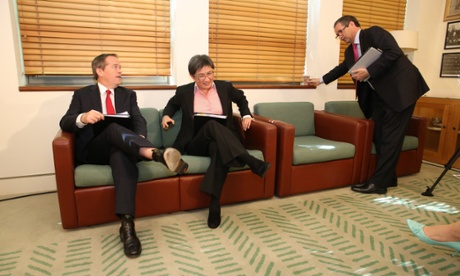
The rich get richer, the poor get the picture.
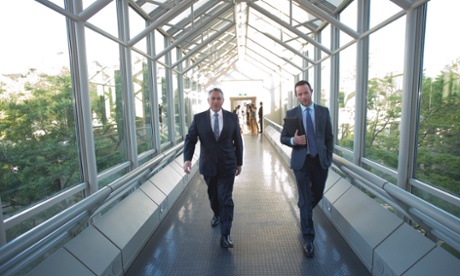
Yesterday, before the Murdoch speech came out, Joe Hockey took a government question in question time on the state of the global economy. He had a very similar message.
The fundamental challenge now for the global economy is when loose monetary policy has done its work and unfortunately made the rich richer through rising asset values but loose monetary policy has effectively been exhausted as a lever to stimulate economic growth on a global basis. Loose fiscal policy—that is, government spending hand over fist—is now limited because they do not have the money to be able to continue to do that and put it on the credit card forever.
It means that the only option for the earning of growth into the future is structural reform. That means having a more competitive world with deregulated labour markets, with barriers to increase protection put up by various countries and making sure that we undertake the domestic reforms in both our budget and the economy to build a stronger economy and ultimately deliver more jobs. That is the only way you can do it now.
This morning, Hockey was asked about the Murdoch prescription.
Chris Uhlmann asked: Joe Hockey, do you agree with Rupert Murdoch’s assessment?
Well, certainly, as he says, loose monetary policy has helped people who own a lot of assets to become richer, and that’s why loose monetary policy needs to be reversed over time, and we’ll get back to normal levels of monetary policy, normal levels of interest rates. Governments, on the other hand, have also run out of money and can’t keep spending money - particularly on the credit card - to try and stimulate growth. So, if loose monetary policy is not available, and actually makes the rich get richer, and governments have run out of money, how are we going to get growth going in the world economy over the next few years? And the only way to do it is through structural changes that make us better at what we do.
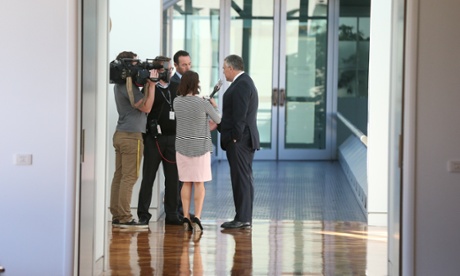
Bill Shorten is launching a campaign against the government’s higher education changes which would deregulate university fees, increase student loan interest rates and reduce government subsidies.
He was speaking to the Labor caucus room, summoning up the spirit of Gough, saying university places should be awarded on “hard marks” or rather “good marks and hard work”.
We will fight the Liberals debt sentence and we will prevail.
The senate will be debating the bill, which is why Labor is campaigning on the issue. There will be TV ads down the track and an online campaign. Palmer has already said his senators will not be supporting the bill. The government needs six out of the eight crossbenchers to get it through, which is not looking likely.
Like ornate book ends, Rupert Murdoch and the PM’s business advisor Maurice Newman have some interesting offerings on world prosperity and global cohesion this morning.
In his speech for the G20, billed as a “confronting message” for world ministers and central bankers, Murdoch warned there was a risk to “the ladder of generational progress” in the developed world. There was a “massive shift” in policies to benefit the super rich. A “great global reckoning” has arrived. This is a time when “great leaders are fashioned”. We should all be concerned about polarisation, he said.
Until you get to this point, you may think Rupert has been reading too much Thomas Piketty. Until:
In America, the most highly paid 1% now pay 46% of all income tax.
Then there’s the solution.
There’s only so much governments can do, says Murdoch. Essentially, governments need to get out of the way and provide:
- labour market reforms
- lower and more competitive corporate taxes
- a rethink on excessive bank regulation
- a crackdown on multinationals like Google so they pay taxes in the country where they make profits, and
- a recognition that higher taxes and over regulation were damaging economic growth and the public interest.
Maurice Newman, head of the government’s Business Advisory Council, has had a crack at the World Health Organisation and more broadly, the United Nations, and its response to ebola, among other things.
The UN has become the refuge of anti-Western authoritarians bent on achieving one-world government. It is unrepresentative and elitist. It eschews capitalism and subtly spreads the cause of socialism through treaties on everything from employment to climate change. Most important, it is directly accountable to no one and is an unworkable concept.
Federal cabinet has approved a $1bn fund to help clean up asbestos in Canberra put into houses decades ago by a contractor called Mr Fluffy. Lenore Taylor broke this story yesterday. The $1bn will be a loan and will not come off the bottom line of the budget.
As the Medicare co-payment languishes in the senate, last night the prime minister co-opted medical researches to lobby senators for the funding mechanism for the $20bn research fund announced in the budget. Tony Abbott was speaking to the Association of Australian Medical Research Institutes. We learnt that not only does Abbott want to be an infrastructure prime minister and a prime minister for indigenous Australia, but a prime minister for medical research.
As some of you might know, when I was the health minister some years ago I regarded myself as the health minister for medical research and now I’d like to regard myself as the prime minister for medical research.
Then he reminded the researchers, if they want their dosh, they have to start knocking on doors.
Yes, the funding mechanism is controversial; we are asking for a modest co-payment from people who are visiting their general practitioner. No one likes to pay more for anything, but it seems to me that if it’s fair and reasonable for people to make a modest contribution when they get their PBS drugs – the drugs that so many of you have made such a contribution towards – why isn’t it also fair and reasonable for this modest contribution when you visit the doctor, particularly when for quite a few years all of the proceeds are going to be invested in what will be a world changing fund, in what will help people’s lives, not just here, but right around the world? This is history making, this is culture shifting, this is life changing. So, my request to all of you in this room tonight: please don’t leave tomorrow without knocking on the door of a crossbench Senator and saying, “For our country’s sake – for our country’s sake, for the world’s sake – have a look at this fund”.
Good morning fellow political junkies,
There are many dishes on the Australian parliamentary smorgasbord this morning. While I don’t want to frighten you off the blog, here is a list of the moving parts which we shall tease out during the morning:
- The foreign fighters bill - the second tranche of national security laws - will go to the senate for debate today. The government has extended sitting hours to get the bill through.
- The senate committee report into the higher education changes is due to come down from on high. At the same time, Clive Palmer has confirmed his senators will vote against the deregulation of university fees and so will Motoring Enthusiast Ricky Muir, according to Clive. Palmer has given a wide ranging and at times jaw-dropping interview with Fran Kelly - which I will bring you in a minute.
- A class action has been launched against the federal government for compensation for the Labor government’s decision to suspend the live cattle export trade in 2011 after the Four Corners report on cruelty in Indonesian abattoirs.
- The Australian is reporting that anyone who has been potentially exposed to ebola and who refuses home detention could be forcibly quarantined.
- The parliament will also debate parliamentary entitlements. This is the bill that cut back pollies perks as a sop for the tough budget cuts.
- The private health insurance bill is before the house. It is a budget measure that pauses the income tiers which determines the Medicare levy you pay.
- And just for your edification, we learn that in his speech in the lead up to the G20, Rupert Murdoch has warned that government policies around the world have caused a “massive shift” in societies to benefit the super-rich with a legacy of social polarisation.
We have joint party room and caucus meetings this morn so parliament does not sit until midday.
So much more besides, which Mike Bowers and I will bring to you during the day. Join us on Twitter @gabriellechan and @mpbowers.







